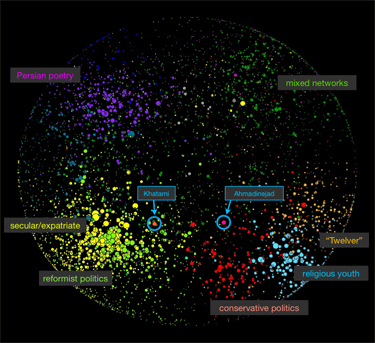In the editorial “New Tweets, Old Needs” experienced journalist Roger Cohen says that Twitter isn’t journalism, and that Iran “has gone opaque” without its mainstream media correspondents. He may be right about the recent paucity of good journalism out of Iran, but he misses some really crucial points about how information flows in the absence of a distribution monopoly (like a printing press.) In particular, he seems to assume that only professional journalists can be capable of producing professional journalism.
It is absolutely true that journalism is much more than random tweeting or blogging. I have been particularly inspired by the notion that “journalism is a discipline of verification,” and a tweet or a blog post neither requires nor endures the fact-checking and truthfulness standards that we expect of our more traditional news media. I also agree that search engines are simply not a substitute for being there. Someone must be a witness. Someone has to feed their experience into the maw of the internet at some point.
However, when Cohen says “the mainstream media — expelled, imprisoned, vilified — is missed” he is implicitly arguing that only the mainstream media can produce good journalism. Traditionally, “journalist” was a distinct, easily defined class: a journalist was someone who worked for a news organization. There weren’t many such organizations, because a distribution monopoly is an expensive thing. All this has changed with the advent of nearly free and truly democratic information distribution, and we are seeing a rapid erosion of the the distinction between professional and amateur or “citizen” journalists. The result is confusion, uncertainty and fear — especially on the part of those who have staked their careers or their fortunes on the clarity of this distinction.
But I see a big difference between journalists and journalism, and this is where Cohen and I part ways.
In my view the failure of journalism in Iran was not the failure of the mainstream media to hold their ground (or their funding, or their audiences) but rather the failure of the journalism profession to educate the public about what exactly it does, and how to do it. When Cohen asks questions such as
But who is there to investigate these deaths — or allegations of wholesale rape of hundreds of arrested men and women — and so shed light?
my answer is, the Iranians, of course!
Naturally, a young activist-turned-reporter does not have the experience or connections of an old-school foreign correspondent. But such a person is there, and they care enormously. What they lack is guidance. What is and is not journalism, exactly? What are the expected standards and daily, on-the-ground procedures of verification? Where can someone turn to for advice on covering the struggles they are immersed in? And what, actually, differentiates the New York Times from a blogger? We need clear answers, because the newspapers are no longer the only ones declaiming the news.
Perhaps the mainstream media couldn’t be in Iran, but they could have been mentoring and collaborating from afar, and yes, publishing the journalism of non-career journalists. And such a project needs to begin long before times of crisis, in every region, so that those who are there are ready.
If “citizen journalism” has so far been somewhat underwhelming, it is because we have not taught our citizens to be journalists.


